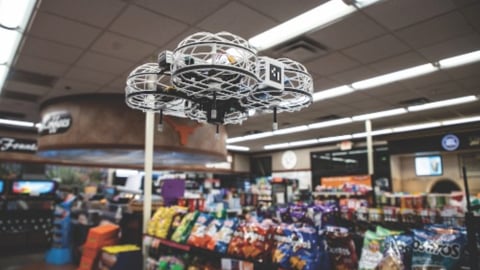Global innovators
The old c-store, it ain’t what it used to be. Whether it’s the adoption of technology to streamline the purchasing process, the introduction of heightened food offerings to meet the needs of increasingly discerning customers, or developing infrastructure capable of meeting the needs of a growing number of EV drivers, the following stores are changing not only the nature of convenience stores, but also their image.
Dash In - United State of America
Remember when c-stores’ grab and go food offering was nothing more than a few forlorn-looking frankfurters and pizza lacking even a hint of pizzazz? There’s perhaps no better example of how far they’ve come in recent years than Dash In’s new location in Loudoun County, Virginia. The 5,600-sq.-ft. store is the result of what Julian B. Wills, president and COO of Dash In’s parent company Wills Group, describes as a five-year journey to “completely reimagine” the store experience. Its “made-for-you” menu includes specialty hamburgers, chips and baked goods made on site, an all-day breakfast, and an automated shake and smoothie machine capable of preparing more than 40 beverages to order. It’s enough to warrant a name change from Dash In, to Stay a While.
Zabka - Poland
Zabka’s name means “little frog,” so it’s not surprising that this Polish c-store chain is leaping ahead of its competitors when it comes to innovation. Zabka boasts more than 8,300 stores serving nearly three million customers each day. As of early this year, it had built Europe’s largest network of cashierless “nano” stores,[i] about 50 in total, boasting “no lines, no cash, and no cash register.” Customers gain access to the stores through their payment card or by scanning the QR code on the Zabka app. A camera system recognizes what items have been taken and customers are charged for products taken off the shelf upon exit. Zabka Group’s executive vice-president Tomasz Blicharski has said that the company’s stated goal is to be the world’s largest operator of autonomous stores, ahead of Amazon.
Family Mart - Japan
It’s not uncommon for convenience stores to feature clothing or clothing-adjacent items like caps or sunglasses, but Japanese chain FamilyMart’s “Convenience Wear” line is comprised of a whole range of everyday items more suited to a department store. Designed by FACETASM designer Hiromichi Ochiai, the “Convenience Wear” line offers everything from a ¥2,719 (approx. $25.20) cardigan, to a ¥390 ($3.61) pair of socks. It also features a rucksack, handkerchiefs, towels and a poncho. Last year, the chain partnered with the hit Netflix show Stranger Things to create socks and a handkerchief using the show’s 1980s-inspired colour scheme. Proof that for anyone who’s more familiar with North American c-stores, their Japanese counterpart can feel like a (far less scary) version of the upside down.
Circle K - Virtual Reality, Toronto
The newest Circle K in downtown Toronto boasts an exclusive shopper profile—students from the Ted Rogers School of Retail Management. This isn’t your neighbourhood c-store, but rather an innovative and immersive “VR Convenience Store Learning Experience” developed to advance retail education in Ontario. It’s the brainchild of Dr. Janice Rudkowski, assistant professor at Ted Rogers School of Retail Management, who approached Leslie Gordon, director of proprietary brands at Circle K, with the idea.
The two have worked together for several years on projects for Rudkowski’s category management course. Ten months in the making, the project, funded by eCampus Ontario, also involved Xpert VR and category management consultant Inez Blackburn, to create a classroom in the form of a virtual Circle K convenience store.
“You feel like you are in a store—it’s amazing,” says Gordon of the truly experiential learning environment. With a realistic store layout, planograms, products, displays and more, the simulated c-store helps students develop critical thinking and decision-making skills, while putting into practice core category management principles of pricing, promotion, product and placement.
“Thinking in terms of retail management, I really wanted to help bring that to life,” says Gordon, who has a passion for category management and aims to promote convenience as a viable career choice with a plethora of opportunities. The VR store has all the typical product categories one would expect to see in a c-store. This innovative c-store will be integrated into TMU’s winter 2024 category management course and available through eCampus Ontario’s Learn Online Portal.
High’s Stores - United States of America
Last year, U.S. operator High’s opened its 60th c-store in the Mid-Atlantic region, a 5,000-sq.-ft. marvel that ticks multiple boxes for innovation and an elevated customer experience. This store has an array of offerings, with a particular emphasis on the latest technology—including self-checkout, mobile ordering through its app, frictionless payment and touchscreen food ordering. The chain has also made a quality food offering one of its cornerstones, with menu items including hand-breaded chicken, handmade pizza and an expanded area for hold and cold beverages. The site also boasts a state-of-the-art car wash with a large vacuum area free to users.
First published in the September | October 2023 issue of Convenience Store News Canada







